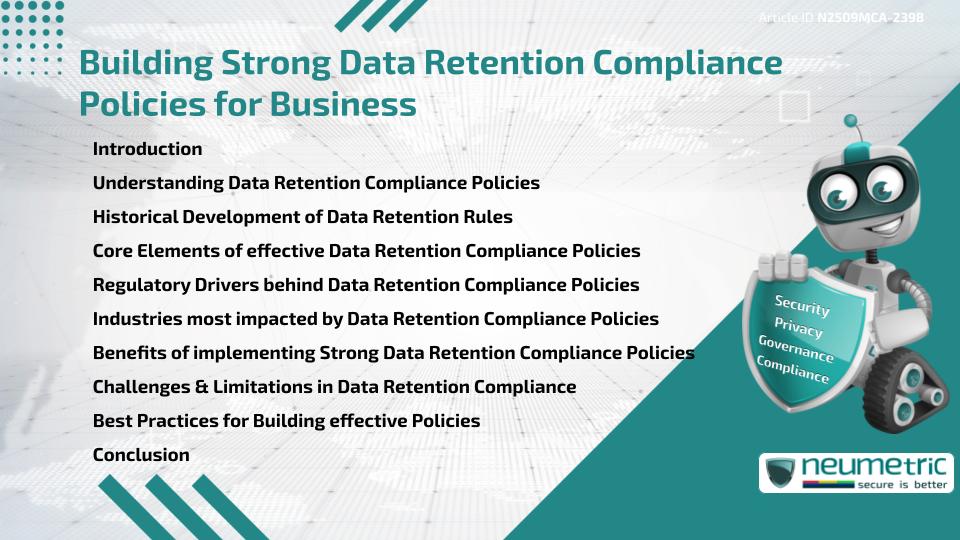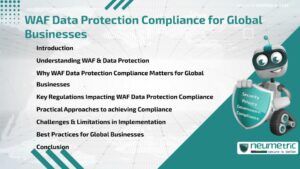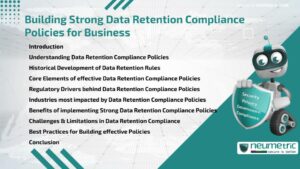Table of Contents
ToggleIntroduction
Data Retention Compliance Policies are essential for managing how long Organisations keep Sensitive Information & how it is securely disposed of. These Policies help meet Legal obligations under frameworks like GDPR, HIPAA & PCI DSS while reducing storage Costs & minimising Risk exposure. Without proper Data Retention Compliance Policies, Businesses face Fines, Inefficiencies & Reputational damage. This article explains what Data Retention Compliance Policies are, their history, Regulatory context, benefits, challenges & best practices for building strong Policies that support both Compliance & Operational needs.
Understanding Data Retention Compliance Policies
Data Retention Compliance Policies define how long different types of records must be stored & when they should be securely deleted. These Policies apply to Electronic Records, Emails, Databases & Physical documents. They ensure that Businesses retain Information for the Legally required period while preventing unnecessary accumulation of Sensitive Data that could be exposed in a Breach.
Historical Development of Data Retention Rules
The concept of Data Retention is not new. Paper Record-keeping Laws existed long before the digital age. With the rise of Digital Storage in the 1990s, Regulatory bodies began issuing specific Rules for Electronic Data. High-profile Data Breaches & Privacy scandals in the 2000s led to stricter Global Regulations, such as GDPR & HIPAA, making Data Retention Compliance Policies a critical part of Corporate Governance.
Core Elements of effective Data Retention Compliance Policies
Strong Data Retention Compliance Policies usually include:
- Classification of Data types: Differentiating Personal, Financial, Health & Operational Data.
- Retention Timelines: Specifying how long each category must be kept.
- Secure Storage: Ensuring Data is protected during its Lifecycle.
- Deletion Procedures: Defining how & when Data must be securely erased.
- Access Controls: Limiting who can view or modify retained Data.
- Audit & documentation: Recording Retention & Deletion activities for Compliance.
These elements make Retention Policies practical, enforceable & Audit-ready.
Regulatory Drivers behind Data Retention Compliance Policies
Several Global Regulations mandate strong Data Retention Compliance Policies:
- GDPR: Requires Data Minimisation & timely deletion of Personal Data.
- HIPAA: Mandates Retention of Healthcare Records & Safeguards for Patient Data.
- PCI DSS: Requires Retention of Payment-related Data with Encryption & secure Handling.
- SOX: Enforces Retention of Financial Records for specified periods.
- NIST guidance: Provides Best Practices for secure Storage & Disposal.
These frameworks highlight that Retention Policies are both a Compliance necessity & a Security measure.
Industries most impacted by Data Retention Compliance Policies
Industries dealing with Sensitive or Regulated Information are most affected by Retention requirements:
- Healthcare: Required to retain Patient Records under HIPAA.
- Financial Services: Bound by SOX & PCI DSS for Record-keeping.
- Retail & E-Commerce: Subject to PCI DSS for Payment Data.
- Government & Legal sectors: Must comply with archival & public record Laws.
- Technology & SaaS Providers: Expected to maintain Data accountability for Customers.
These Industries rely heavily on clear Retention Policies to balance Compliance & Efficiency.
Benefits of implementing Strong Data Retention Compliance Policies
Organisations gain significant advantages when adopting robust Data Retention Compliance Policies:
- Reduced Risk of Fines & Penalties
- Lower storage Costs through Data Minimisation
- Enhanced security by reducing exposure of unnecessary Data
- Simplified Audit preparation & Regulatory reporting
- Increased Trust with Customers, Partners & Regulators
Strong Policies turn Compliance into a strategic asset for both Security & Reputation.
Challenges & Limitations in Data Retention Compliance
Despite the benefits, implementing effective Data Retention Compliance Policies has challenges:
- Difficulty classifying large volumes of diverse Data
- Conflicting Retention requirements across multiple Regulations
- Resistance from Employees accustomed to storing all Data indefinitely
- Costs associated with secure deletion Tools & Audit systems
- Risks of retaining Data longer than required, increasing Breach exposure
These limitations highlight the need for continuous review & adaptation of Policies.
Best Practices for Building effective Policies
To build strong Data Retention Compliance Policies, Organisations should:
- Conduct a Data inventory to identify Retention needs
- Align Retention timelines with Regulatory & Business requirements
- Implement automated Tools for deletion & archiving
- Train Employees on Compliance responsibilities
- Regularly review Policies for Regulatory updates or Business changes
- Document all processes to provide Audit Evidence
Following these practices ensures Policies remain effective, practical & compliant.
Conclusion
Data Retention Compliance Policies are vital for Legal accountability, Risk reduction & Operational efficiency. By defining clear Retention Rules, adopting secure Storage & Deletion practices & aligning with Global Regulations, Businesses can protect Sensitive Information while demonstrating responsibility.
Takeaways
- Data Retention Compliance Policies define how long Information is stored & when it is deleted
- Historical development moved from paper-based Rules to digital Retention Laws
- Core elements include Classification, Timelines, Deletion Procedures & Audits
- Regulations like GDPR, HIPAA, PCI DSS & SOX drive Retention obligations
- Key Industries include Healthcare, Finance, Retail, Government & Technology
- Benefits include reduced Risk, lower Costs, stronger Trust & better Audits
- Challenges involve Classification, conflicting Rules & Employee resistance
- Best Practices include Inventories, Automation, Training & regular Reviews
FAQ
What are Data Retention Compliance Policies?
They are structured Rules that define how long records are kept & when they must be securely deleted.
Why are Data Retention Compliance Policies important?
They ensure Regulatory Compliance, reduce Breach Risks & lower Storage Costs.
Which Regulations require Data Retention Compliance Policies?
GDPR, HIPAA, PCI DSS, SOX & NIST guidance all mandate or recommend strong Data Retention Rules.
How long should Data be retained?
Retention periods vary by Regulation & Data type, often ranging from one (1) to seven (7) years.
Can Small Businesses implement effective Data Retention Compliance Policies?
Yes, by using affordable archiving Tools & aligning timelines with Regulations.
What happens if Organisations fail to comply with Retention Rules?
They Risk Fines, Reputational damage, inefficiencies & higher exposure in Breaches.
How can Policies be kept up to date?
By reviewing them regularly, monitoring Regulation changes & updating Tools & Processes.
Need help for Security, Privacy, Governance & VAPT?
Neumetric provides Organisations the necessary help to achieve their Cybersecurity, Compliance, Governance, Privacy, Certifications & Pentesting needs.
Organisations & Businesses, specifically those which provide SaaS & AI Solutions in the Fintech, BFSI & other regulated sectors, usually need a Cybersecurity Partner for meeting & maintaining the ongoing Security & Privacy needs & requirements of their Enterprise Clients & Privacy conscious Customers.
SOC 2, ISO 27001, ISO 42001, NIST, HIPAA, HECVAT, EU GDPR are some of the Frameworks that are served by Fusion – a SaaS, multimodular, multitenant, centralised, automated, Cybersecurity & Compliance Management system.
Neumetric also provides Expert Services for technical security which covers VAPT for Web Applications, APIs, iOS & Android Mobile Apps, Security Testing for AWS & other Cloud Environments & Cloud Infrastructure & other similar scopes.
Reach out to us by Email or filling out the Contact Form…





